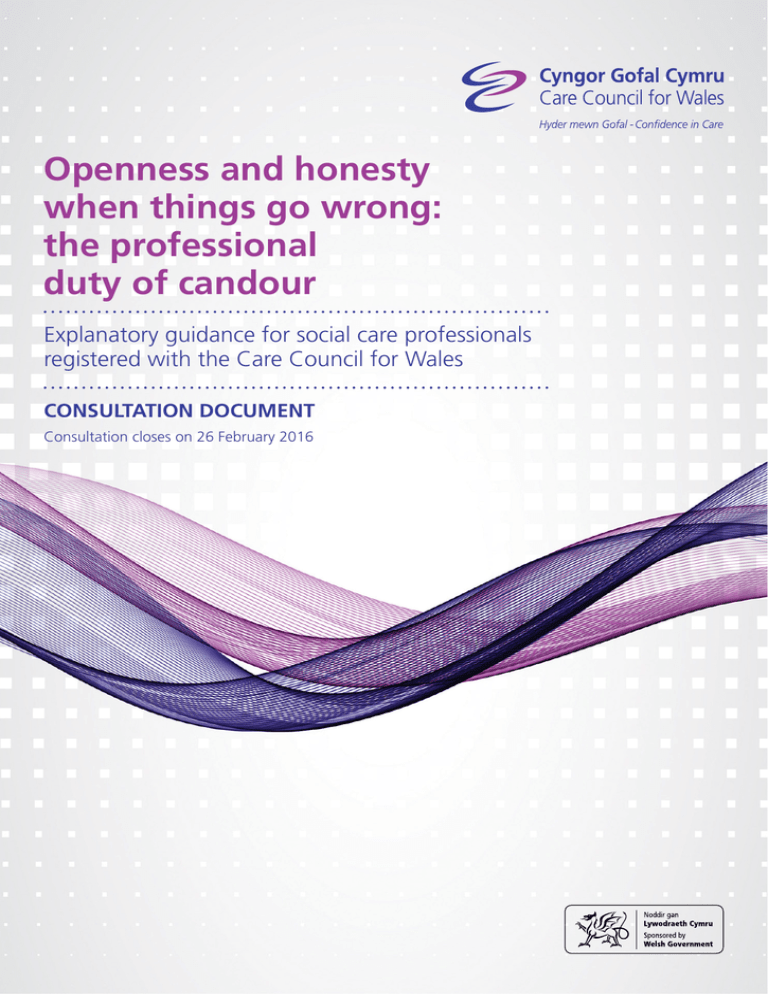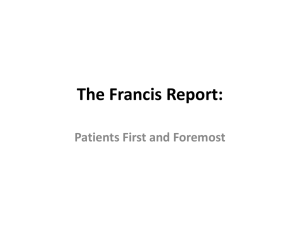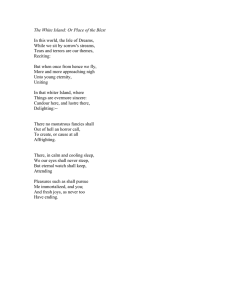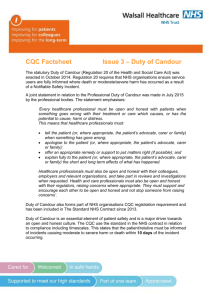Openness and honesty when things go wrong: the professional duty of candour
advertisement

Openness and honesty when things go wrong: the professional duty of candour Explanatory guidance for social care professionals registered with the Care Council for Wales CONSULTATION DOCUMENT Consultation closes on 26 February 2016 Openness and honesty when things go wrong: the professional duty of candour This guidance should be read in conjunction with: www.ccwales.org.uk CODE OF PROFESSIONAL PRACTICE The social care manager Practice Guidance for Social Care Managers Registered with the Care Council for Wales for Social Care 1 The Code of Professional Practice for Social Care Practice Guidance for Social Care Managers Practice Practice Guidance for Guidance for Social Workers Residential Child Care Workers Contact Details Care Council for Wales South Gate House Wood Street Cardiff CF10 1EW Tel: 0300 3033 444 Fax: 029 2038 4764 Minicom: 029 2078 0680 E-mail: info@ccwales.org.uk www.ccwales.org.uk CareCareersWales @CareCouncil ISBN: 978-1-909867-84-0 © 2015 Care Council for Wales All rights reserved. No part of this publication may be reproduced, stored in a retrieval system or transmitted in any form or by any means without the prior written permission of the Care Council for Wales. Enquiries for reproduction outside the scope expressly permitted by law should be sent to the Chief Executive of the Care Council for Wales at the address given above. Further copies and other formats: Copies are available in large print or other formats if required. 2 www.ccwales.org.uk Contents About this consultation . . . . . . . . . . . . . . . . . . . . . . . . . 4 1. W hat the Care Council already says about openness and honesty . . . . . . . . . . . . . . . . . . . . .5 2. The professional duty of candour . . . . . . . . . . . . . . . . . . 6 3. Telling the individual and putting things right . . . . . . . . . . . 6 4. Being open and honest with your organisation . . . . . . . . . . .7 5. Learning from mistakes . . . . . . . . . . . . . . . . . . . . . . . .7 6. Additional responsibilities for managers . . . . . . . . . . . . . . .8 7. Your organisation’s duty of candour . . . . . . . . . . . . . . . . .8 Appendix . . . . . . . . . . . . . . . . . . . . . . . . . . . . . . . . .9 3 Openness and honesty when things go wrong: the professional duty of candour About this consultation This consultation presents draft explanatory guidance on duty of candour for all social care professionals (social workers, social care managers, residential child care workers) registered with the Care Council. The Care Council has agreed a Policy for Development and Implementation of Explanatory Guidance for Workers registered with the Care Council for Wales. The policy sets out the circumstances in which the Care Council may develop explanatory guidance to provide more detail on the principles in practice guidance and the Code of Professional Practice for Social Care. The professional duty of candour has been identified as an area requiring more guidance. This is because the new Code of Professional Practice for Social Care (Code of Professional Practice) includes for the first time “you must be accountable for the quality of your work… this includes being open and honest with people if things go wrong, including providing a full and prompt explanation to your employer or the appropriate authority of what has happened” (section 6.3). This new requirement in the Code derives in part from the Report of the Mid Staffordshire NHS Foundation Trust Public Inquiry (Francis Report). The Francis report contained 12 recommendations all relating to ‘openness, transparency and candour’ including a review of professional codes and guidance to make requirements explicit. This guidance aims to provide a practical tool, aiding professionals in their practice. The intention is to support professionals to deliver high quality services, working alongside individuals and meeting the aspirations of the Social Services and Well-being (Wales) Act and the Regulation and Inspection Bill. There is a corresponding expectation that employers will actively promote an open and fair culture in the workplace, with an emphasis on improvement and learning from mistakes. How to submit a response to the consultation The Care Council is inviting comments on this draft explanatory guidance by 26 February 2016. Go to: www.surveymonkey.com/r/dutyofcandour Responding by post or e-mail: Using the questionnaire at the end of this document, or another format if preferred, please send your response to: Sheila Lyons, Care Council for Wales, Unit 19, St Asaph Business Park, St Asaph, Denbighshire LL17 0LJ sheila.lyons@ccwales.org.uk 4 www.ccwales.org.uk Explanatory guidance for social care professionals 1. What the Care Council already says about openness and honesty In the Code of Professional Practice for Social Care, section 6.3, we say: You must be accountable for the quality of your work… this includes being open and honest with people if things go wrong, including providing a full and prompt explanation to your employer or the appropriate authority of what has happened. In practice guidance we say: If you or your staff make a mistake you must be open and honest about it, including providing a full and prompt explanation to your manager or employer of what has happened. You should be willing to reflect on and learn from mistakes. In this explanatory guidance we explain and expand on how social care professionals can put these standards into practice. Serious or persistent failure to follow this explanatory guidance will put your registration at risk. 5 Openness and honesty when things go wrong: the professional duty of candour 2. The professional duty of candour1 As a social care professional you must be open and honest with individuals2 when something that goes wrong with their care or support has, or has the potential to have, an adverse effect on their well-being. This means that you must: • tell the individual (or where appropriate the individual’s carer, family or advocate) when something has gone wrong; • apologise to the individual (or where appropriate the individual’s carer, family or advocate); • explain to the individual (or where appropriate the individual’s carer, family or advocate) the consequences of what has happened; • r emind the individual (or where appropriate the individual’s carer, family or advocate) of their right to make a complaint; and • involve the individual in deciding an appropriate remedy to put things right, where possible. You must also: •b e open and honest with your manager, employer and relevant organisations, and take part in investigations and reviews when required; •b e open and honest with your regulatory bodies, raising concerns when appropriate; and • s upport and encourage other professionals to be open and honest and to raise their concerns. You must not obstruct a colleague in raising their concerns. 3. Telling the individual and putting things right When you realise that something has gone wrong (see Appendix 1 for examples), and after doing what you can immediately to put things right, you or someone from your team should speak to the individual. If you are unsure about who should speak to the individual, you should get advice from your manager. You should share, sensitively and in language the individual can understand, all you know and believe to be true about what went wrong and why and what the consequences are likely to be. You should explain about any investigation taking place and when the outcome is likely to be known. 1 Definition of ‘candour’ - the volunteering of all relevant information to persons who have, or may have, been harmed by the provision of services, whether or not the information has been requested, and whether or not a complaint or a report about that provision has been made 2 In this document, the term ‘individual’ refers to the person the social care professional supports or cares for in their work whether that be a child, young person or adult. 6 www.ccwales.org.uk You should apologise to the individual about what happened. An apology does not amount to an admission of legal liability. But the individual has the right to receive an apology from the most appropriate team member. Where the event or incident in question gives rise to an allegation of impaired fitness to practise, it is relevant to note that a fitness to practise panel may view an apology as evidence of insight. You should record the details of your apology in the individual’s records. You should involve the individual in deciding how to put things right where possible, recognising this may require more than one conversation and allowing the individual time to consider their options and take advice. You should make sure the individual knows who to contact if they have any further questions or concerns, or wish to speak to someone more senior, or need support. You should make sure they have information about how to make a complaint, independent advocacy and other support available. 4. Being open and honest with your organisation When something goes wrong with an individual’s care and support, it is crucial it is reported at an early stage so that lessons can be learned and individuals can be protected in the future. You must follow your organisational policy relevant to what has happened, for example, health and safety, reporting, security policy etc. Similarly, you should be open and honest with your organisation about ‘near misses’, i.e. incidents that had the potential to cause harm but did not do so. If you are unsure about your role or how to proceed with dealing with a mistake or a ‘near miss’, you must seek assistance from a manager or other senior colleague in your organisation. 5. Learning from mistakes You must take part in investigations and reviews of the standards and performance of your work and your team, actively working to improve the service. You should use supervision, appraisal and staff development opportunities to reflect on your practice and that of your team in order to learn and improve. Most importantly, you must listen to the views and experiences of the individuals you support and care for in your work and learn from them. 7 Openness and honesty when things go wrong: the professional duty of candour 6. Additional responsibilities for managers If you are responsible for leading, managing, supervising, mentoring or supporting other social care professionals, you should promote openness and honesty as described in this guidance and address any concerns. You should do all that you can to encourage an open and learning culture in the workplace. You should promote awareness of the Code of Professional Practice by individuals who use the service. You should ensure that the staff you line manage receive the induction, support, supervision and staff development opportunities they require to know what is expected of them and to provide a safe, high quality service. You should ensure that mistakes are investigated thoroughly and appropriately and in accordance with organisational policies and legal requirements. You should implement and monitor recommendations for improvement arising from investigations. If monitoring identifies repeated mistakes, you must take appropriate action. 7. Your organisation’s duty of candour All social care organisations have a duty to support staff to report adverse incidents, to support staff to be open and honest and to develop best practice. If systems are not in place in your organisation, you should speak to your manager or employer. If those responsible do not take adequate action, you should seek independent advice from an appropriate regulatory or advisory body. NB: the Care Council Practice Guidance relevant to your role includes additional guidance on raising and acting on concerns. 8 www.ccwales.org.uk Appendix What can go wrong with an individual’s care and support? In this guidance, the duty of candour applies when something goes wrong with an individual’s care or support that has, or has the potential to have, an adverse effect on the individual’s well-being. Things can go wrong even when services are well run and managed: the consequences can range from minor inconvenience to serious, even long term implications for an individual’s life. Things can go wrong as a result of action or inaction on the part of a social care professional or other member of the team and, whilst by no means an exhaustive list, might include: • giving the wrong information; • losing an individual’s belongings; • breaching confidentiality; • medication errors; • breaching organisational policy and guidelines, e.g. in the use of restrictive physical intervention; • equipment not used properly; • not passing on important information to a colleague or manager; • not acting on concerns raised by an individual; • inadequate standards of personal care; and • providing a poorer service than reasonably expected, etc. 9 Openness and honesty when things go wrong: the professional duty of candour Explanatory guidance on duty of candour Consultation questions 1. Do you agree that the guidance will support registered social care professionals to deliver a high quality and citizen centred service? YesNo Please let us have your comments The Royal College of Nursing Wales agrees that this guidance will support registered social care professionals to deliver a high quality and citizen centred service in its present form. The document goes some way to promoting safe practice, however it needs strengthening in a number of areas. The document does not provide the necessary sense of gravitas or expectation when reading it. There is a balance to strike between avoiding a culture of blame and ensuring individuals and organisations take responsibility when things go wrong. In terms of this guidance, it would also be helpful to understand the public’s view on the strength of the language used in the document. In order deliver this high quality and citizen centred service, including information on working within a sphere of competence, having access to education and continuing professional development for these professionals would aid this. 2. Do you have any comments on the content of the guidance? YesNo Please let us have your comments In relation to content the guidance covers the relevant areas, but not in any great depth. This can be interpreted as a positive aspect of the guidance. The guidance in its current form is less threatening. It is concise and informative, and well supported by the supporting documents. The narrative within those documents is also simple. For these reasons, we believe it functions for all levels of professional ability. 10 www.ccwales.org.uk 3. D o you have any comments on the language, format or style of the guidance? YesNo Please let us have your comments In light of the comments above on the content of the guidance, the language used in this document could be perceived as oversimplified, considering the fact that the guidance is for qualified social workers and registered managers. However, the supporting documents to be read in conjunction provide further detail. In regards to the consultation document itself, Point 5 on ‘Learning from mistakes’, states that ‘Most importantly, you must listen to the views and experiences of the individuals you support and care for in your work and learn from them’. It is the view of the RCN that it is not useful to identify something as most important, as this is subjective and potentially misleading to those who read the document for help and guidance. 4. D o you have any views on how the guidance should be implemented and used? YesNo Please let us have your comments N/A 11 Openness and honesty when things go wrong: the professional duty of candour 5. Have you replied to this consultation? • On behalf of an organisation • On behalf of a team • As an individual 6. Please give your name / name of organisation / name of team, as appropriate and contact details (optional): Royal College of Nursing Wales Professional Practice Team Lisa Turnbull – Lisa.Turnbull@rcn.org.uk 7. What is your interest in responding to this consultation? • Social care manager • Residential child care worker • Social worker • Social work student • Individual accessing care and support • Employer • Relative or carer • Other (please specify) Professional body The RCN is the world’s largest professional union of nurses, representing over 430,000 nurses, midwives, health visitors and nursing students, including over 25,000 members in Wales. The majority of RCN members work in the NHS How to submit a working response toindependent the consultation with around a quarter in the sector. The RCN works locally, nationally and internationally to promote standards care and the The Care Council is inviting comments on this draftof explanatory interests of by patients and nurses,2016. and of nursing as a profession. The RCN is a guidance 26 February UK-wide organisation, with its own National Boards for Wales, Scotland and Go to: www.surveymonkey.com/r/dutyofcandour Northern Ireland. The RCN is a major contributor to nursing practice, standards of care,send and public policy as itto: affects health and nursing. Alternatively, your response Sheila Lyons, Carenurses Council Wales, The RCN represents andfor nursing, promotes excellence in practice and Unit 19, St Asaph Business Park, St Asaph, Denbighshire LL17 0LJ shapes health policies. or e-mail sheila.lyons@ccwales.org.uk 12




